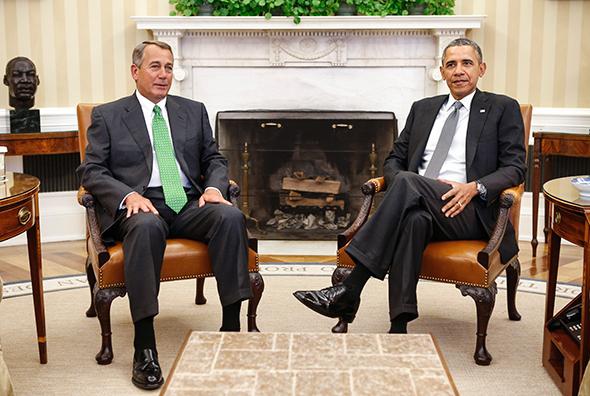Washington is coasting. For the past several years, chroniclers of the relationship between the president and Republicans in Congress have searched in vain for new ways to describe chaos. When chaos wasn’t on order, the task was to find new ways to connote stasis—the lack of progress that filled the exhausted interregnum between periods of chaos.
Now the job has changed a bit. Crisis budgeting that led to tense moments is largely gone, mostly because House Republicans have decided not to stage confrontations. That is healthy, but there seems to have been a collective decision that like the convalescent, no politician is going to risk tearing the stitches by doing much more than padding around the ward. No one is going to do anything big or risky. The pace of action is neither chaotic nor energetic but just shy of slipping on a Snuggie and settling in for a Lord of the Rings marathon.
This is, of course, pathetic. Republicans and Democrats are both so frightened about creating fights within their own parties during an election year that they are leaving the big questions unanswered. Today, House Committee on Ways and Means Chairman Dave Camp put forward a set of fundamental tax reform proposals. It was the product of years of work between Camp, a Republican, and his Democratic counterpart in the Senate, Max Baucus. The two traveled across the country holding hearings, taking in mountains of input, and engaging in all the other kinds of activity that most people like to think of when they think of elected representatives doing their jobs.
All that work is going nowhere. No one in either party wants to risk taking on the complicated and tricky issue that might offend big contributors or stir up voters in the wrong way. There will continue to be talk on both sides, but no one is going to get anything done. Budget expert Stan Collender thinks that means no action on this issue until 2019.
Trade and immigration are two other items that have gone from the back burner to the freezer. House Speaker John Boehner won’t start a fight in his party by bringing up immigration reform, and President Obama won’t force his party to take up trade legislation that the president says will help the economy.
The stakes are so low in Washington that Obama and Boehner could even sit down and meet again after a long pause. Tuesday, the two men talked for an hour in what was their longest noncrisis conversation in years. Boehner emerged calling it a “nice meeting” and then went back to beating up on the president and his health care law.
So if nothing is going to get done, what did they talk about? Well, just because no one in Washington is going to do anything big or meaningful doesn’t mean they have totally banished their chance to do a little something.
There is a possibility that the appropriations process will actually take place in some form this year. Spending items may actually be considered by a committee in which people will have their say about the merits of each program. Although the big budget questions of our time—big new spending or entitlement reforms—are still out of the conversation, at least spending levels won’t be determined by sequestration. There’s also a slim chance that Congress might work together on the transportation bill, flood insurance, and a water resource bill in the way that members worked together to pass the farm bill.
Those are not grand pieces of legislation, but they are what one top congressional aide calls the “meat and potatoes” of operating a government. A cynic might also call them the least lawmakers can be expected to do and still deserve the name. Of course, even limited progress is the optimistic view. Though the temperature has lowered and chaos is on pause, it’s still possible that lawmakers could slip from risk-free coasting to a full-on coma. Given how few legislative days are scheduled for this election year, it may be impossible even to handle the meat-and-potato basics. Congress may, for example, once again resort to passing a continuing resolution instead of having a proper appropriations process.
This week, Rep. John Dingell, the longest-serving member of Congress, announced that he is retiring. He’s out of a job, but a sculptor just got a new one. The House will no doubt commission a monument to commemorate Dingell’s more than 58-year career of legislative action. All the other sculptors can take off, though. Even if there are a few achievements this year, they won’t be anything to chisel home about.
